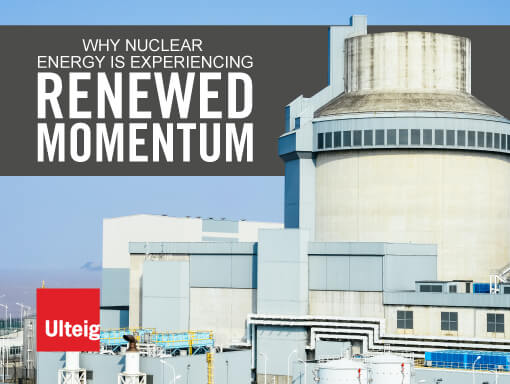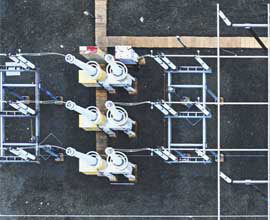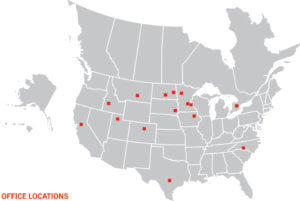Why Nuclear Energy is Experiencing Renewed Momentum

May 1, 2023
“Almost all reports on future energy supply from major organizations suggest an increasing role for nuclear power as an environmentally benign way of producing reliable electricity on a large scale.”
This excerpt from an October 2022 World Nuclear Association report suggests a return to a power source once condemned, but — for a litany of reasons and the passage of time — is experiencing a renewed sense of momentum: nuclear energy.
In recent years, nuclear energy has been experiencing a reappraisal — even a renewed momentum — globally. Its perceived risks, particularly in the aftermath of high-profile accidents such as Three Mile Island (1979), Chernobyl (1986) and Fukushima (2011), have led many to question whether the benefits of nuclear energy outweigh its potential drawbacks.
Now, in 2023, many countries are turning (or returning) to nuclear power to meet their energy demands due to the many advantages it offers over other forms of energy. This shift is driven by a range of factors:
Factor 1: Reliability and Efficiency
Nuclear energy is one of the most reliable and efficient sources of electricity. Nuclear power plants produced 778 billion kilowatt hours of electricity in 2021, according to the U.S. Department of Energy. Unlike renewable energy sources, such as solar and wind, which depend on changing weather conditions, nuclear power plants can generate electricity 24/7. They can also provide a constant and stable source of energy regardless of climate or unpredictable conditions.
Moreover, nuclear energy has a high power density, meaning that it can produce a large amount of electricity from a relatively small amount of fuel. For instance, all of the used nuclear fuel produced by the U.S. nuclear energy industry over the last 60 years could fit on a football field at a depth of fewer than 10 yards, according to the Department of Energy. This makes it an ideal choice for meeting the increasing demand for energy while reducing our reliance on fossil fuels.
Factor 2: Environmental Friendliness
Given that nuclear power plants do not produce any greenhouse gas emissions or air pollutants during operation, they become one of the cleanest, most sustainable sources of electricity. Furthermore, nuclear energy produces significantly less waste compared to other forms of energy, including coal and oil.
While there are concerns about the disposal of nuclear waste, modern nuclear reactors produce less waste, and are designed to store it safely and securely.
Factor 3: Resource Preservation
“Nuclear power is emerging as an answer to fill the gap as states transition away from coal, oil and natural gas to reduce greenhouse gas emissions and stave off the worst effects of a warming planet,” states NPR in a January 2022 report. As such, nuclear energy can play a significant role in reducing our dependence on fossil fuels and mitigating climate change.
As we shift towards a low-carbon future, nuclear energy can complement other forms of renewable energy, such as solar and wind, to provide a reliable and sustainable source of electricity. Additionally, nuclear energy can help reduce our dependence on imported oil and gas, thereby enhancing energy security and reducing geopolitical tensions.
Factor 4: Safety and Cost-Effectiveness
Modern nuclear reactors are designed to be more efficient and produce less waste, and new reactor designs, such as small modular reactors, are being developed to make nuclear energy more accessible and affordable. “Nuclear power plants are expensive to build but relatively cheap to run,” says the World Nuclear Association. “In many places, nuclear energy is competitive with fossil fuels as a means of electricity generation. Waste disposal and decommissioning costs are usually fully included in the operating costs.”
Additionally, the development of new materials and fuel technologies has made nuclear power plants safer and more reliable.
Factor 5: Global Access
Many countries around the world are investing heavily in nuclear energy, and this is driving growth in the sector. Countries like China, Russia, India and the United States are building new nuclear power plants and expanding their existing nuclear energy capacity.
The World Nuclear Association notes that as of March 2023, 50 countries utilize nuclear energy in about 220 research reactors. Nuclear power currently provides 10 percent of the world’s electricity from 440 power reactors. In the U.S. alone, one-fifth of the country’s electricity comes from nuclear power each year.
Nations around the world are also adopting nuclear energy as part of their national energy policy, recognizing its importance in meeting their energy demands and reducing their carbon footprint.
Reassessing Our Reliance On Nuclear Energy
As we strive towards a low-carbon future, nuclear energy can supplement other forms of renewable energy to provide a reliable and sustainable source of electricity. With advances in technology and increasing investment in the sector, nuclear energy is set to play a crucial role in our energy future.
Since 1944, Ulteig has worked in the power lifeline sector to deliver innovative solutions that are fully custom, integrated, site-specific, proven and dependable. As we continue helping transform our world’s critical infrastructure, nuclear power becomes a major asset.
Connect with us today to continue the conversation.
WHAT MAKES ULTEIG DIFFERENT?
From global energy producers to locally funded cities and private developers to government agencies, the clients we serve encompass a broad range of relationships and projects. Find out why Ulteig is a leader in the engineering industry.
Contact Us



